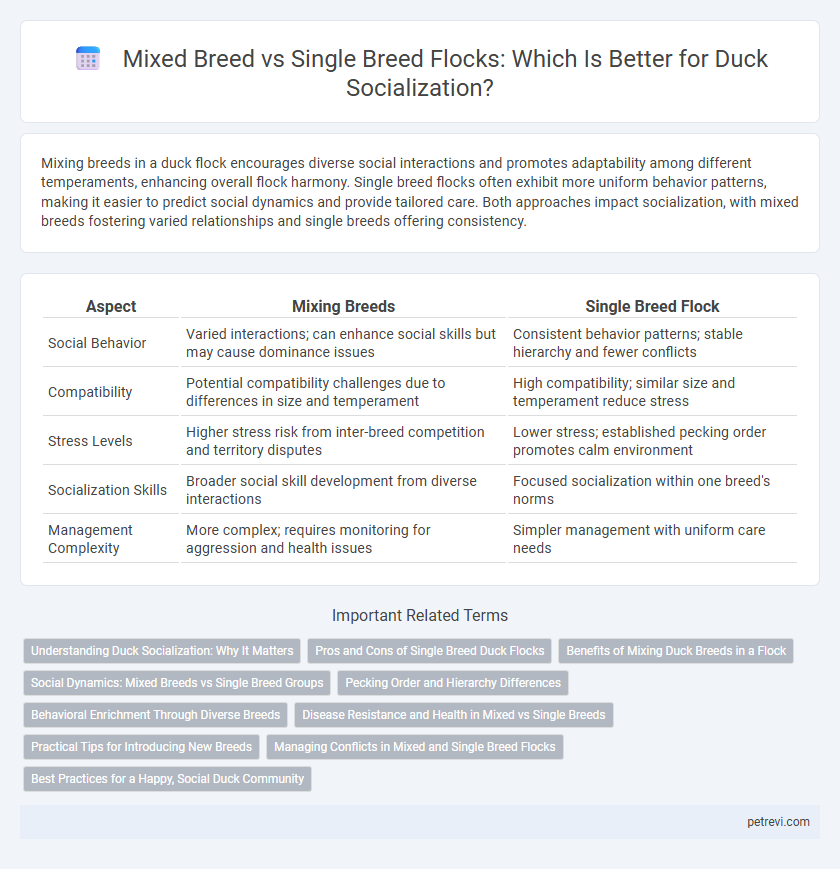Mixing breeds in a duck flock encourages diverse social interactions and promotes adaptability among different temperaments, enhancing overall flock harmony. Single breed flocks often exhibit more uniform behavior patterns, making it easier to predict social dynamics and provide tailored care. Both approaches impact socialization, with mixed breeds fostering varied relationships and single breeds offering consistency.
Table of Comparison
| Aspect | Mixing Breeds | Single Breed Flock |
|---|---|---|
| Social Behavior | Varied interactions; can enhance social skills but may cause dominance issues | Consistent behavior patterns; stable hierarchy and fewer conflicts |
| Compatibility | Potential compatibility challenges due to differences in size and temperament | High compatibility; similar size and temperament reduce stress |
| Stress Levels | Higher stress risk from inter-breed competition and territory disputes | Lower stress; established pecking order promotes calm environment |
| Socialization Skills | Broader social skill development from diverse interactions | Focused socialization within one breed's norms |
| Management Complexity | More complex; requires monitoring for aggression and health issues | Simpler management with uniform care needs |
Understanding Duck Socialization: Why It Matters
Understanding duck socialization is essential for promoting natural behaviors and reducing stress in both single breed and mixed breed flocks. Mixed breed flocks often exhibit diverse interactions that enhance social learning and adaptability, while single breed groups may develop stronger uniform hierarchies. Prioritizing social dynamics fosters healthier ducks, improving overall flock cohesion and well-being.
Pros and Cons of Single Breed Duck Flocks
Single breed duck flocks offer uniform behavior patterns and easier management due to consistent breed traits, which reduces aggression and stress among birds. However, they may lack genetic diversity, making the flock more susceptible to disease and reducing adaptability to environmental changes. Maintaining a single breed requires careful breeding practices to prevent inbreeding and ensure long-term flock health.
Benefits of Mixing Duck Breeds in a Flock
Mixing duck breeds in a flock promotes diverse social interactions, enhancing overall flock harmony and reducing aggressive behaviors common in single-breed groups. Different breeds contribute unique vocalizations and social cues that improve communication and bonding among ducks. This diversity also encourages natural behaviors and adaptability, leading to a healthier and more resilient flock.
Social Dynamics: Mixed Breeds vs Single Breed Groups
Duck socialization varies significantly between mixed breed and single breed flocks, influencing social hierarchy and interaction patterns. Mixed breed groups often exhibit diverse behavioral traits that can create complex social dynamics, sometimes leading to increased competition or dominance challenges. Single breed flocks typically demonstrate more predictable social structures due to uniform behavioral tendencies within the same breed, promoting cohesion and stability.
Pecking Order and Hierarchy Differences
Duck socialization varies significantly between mixed-breed and single-breed flocks due to differences in pecking order dynamics and hierarchy establishment. Single-breed flocks tend to develop a more stable and predictable hierarchy, as uniform size and behavior reduce conflicts. Mixed-breed flocks often experience shifting dominance patterns and increased pecking order disputes caused by size, strength, and temperament disparities among breeds.
Behavioral Enrichment Through Diverse Breeds
Mixing duck breeds enhances behavioral enrichment by promoting diverse social interactions and reducing breed-specific stress behaviors. Different breed traits encourage varied pecking orders, foraging styles, and communication methods, which stimulate mental and physical activity. Maintaining a mixed flock supports natural social dynamics and increases overall flock resilience compared to a single breed group.
Disease Resistance and Health in Mixed vs Single Breeds
Mixed breed duck flocks often demonstrate improved disease resistance due to greater genetic diversity, which can enhance overall immunity and reduce susceptibility to common infections. Single breed flocks may face higher health risks as uniform genetics could lead to increased vulnerability to specific pathogens and slower recovery times. Incorporating multiple breeds can promote a resilient social environment that naturally supports stronger health outcomes in ducks.
Practical Tips for Introducing New Breeds
Introducing new duck breeds to a single breed flock requires gradual integration to minimize stress and aggression; start by housing new ducks in a separate pen adjacent to the existing flock for 1-2 weeks to allow visual and auditory familiarization. Provide ample space, multiple feeding areas, and hideouts to reduce competition and establish a peaceful hierarchy. Observe interactions closely and gradually increase supervised contact until the new and resident ducks merge into a cohesive group.
Managing Conflicts in Mixed and Single Breed Flocks
Managing conflicts in mixed breed duck flocks requires careful monitoring as diverse temperaments and social hierarchies often lead to increased aggression and stress. Single breed flocks tend to exhibit more predictable social structures, reducing conflict instances and easing dominance disputes. Implementing adequate space, environmental enrichment, and observation protocols enhances harmony and minimizes injury risks in both flock types.
Best Practices for a Happy, Social Duck Community
Mixing breeds in a duck flock can enhance social interaction by introducing diverse behaviors and temperaments that encourage natural socialization and reduce boredom. A single breed flock often benefits from uniformity in size and temperament, minimizing dominance conflicts and making it easier to manage group dynamics. Providing ample space, consistent feeding routines, and environmental enrichment supports a harmonious, happy community regardless of breed composition.
Mixing breeds vs Single breed flock for Duck socialization Infographic

 petrevi.com
petrevi.com